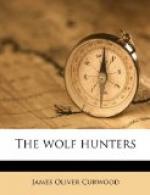“There is only one thing to do, boys. We’ll clean out everything there is in the cabin, and to-morrow we’ll tear up the floor. You can’t tell what there might be under it, and we’ve got to have a new floor anyway. It is getting dusk, and if we have this place fit to sleep in to-night we have got to hustle.”
No time was lost in getting the debris of the cabin outside, and by the time darkness had fallen a mass of balsam boughs had been spread upon the log floor just inside the door, blankets were out, packs and supplies stowed away in one corner, and everything “comfortable and shipshape,” as Rod expressed it. A huge fire was built a few feet away from the open door and the light and heat from this made the interior of the cabin quite light and warm, and, with the assistance of a couple of candles, more home-like than any camp they had slept in thus far. Mukoki’s supper was a veritable feast—broiled caribou, cold beans that the old Indian had cooked at their last camp, meal cakes and hot coffee. The three happy hunters ate of it as though they had not tasted food for a week.
The day, though a hard one, had been fraught with too much excitement for them to retire to their blankets immediately after this meal, as they had usually done in other camps. They realized, too, that they had reached the end of their journey and that their hardest work was over. There was no long jaunt ahead of them to-morrow. Their new life—the happiest life in the world to them—had already begun. Their camp was established, they were ready for their winter’s sport, and from this moment on they felt that their evenings were their own to do with as they pleased.
So for many hours that night Rod, Mukoki and Wabigoon sat up and talked and kept the fire roaring before the door. Twenty times they went over the tragedy of the old cabin; twenty times they weighed the half-pound of precious little lumps in the palms of their hands, and bit by bit they built up that life romance of the days of long ago, when all this wilderness was still an unopened book to the white man. And that story seemed very clear to them now. These men had been prospectors. They had discovered gold. Afterward they had quarreled, probably over some division of it—perhaps over the ownership of the very nuggets they had found; and then, in the heat of their anger, had followed the knife battle.
But where had they discovered the gold? That was the question of supreme interest to the hunters, and they debated it until midnight. There were no mining tools in the camp; no pick, shovel or pan. Then it occurred to them that the builders of the cabin had been hunters, had discovered gold by accident and had collected that in the buckskin bag without the use of a pan.




